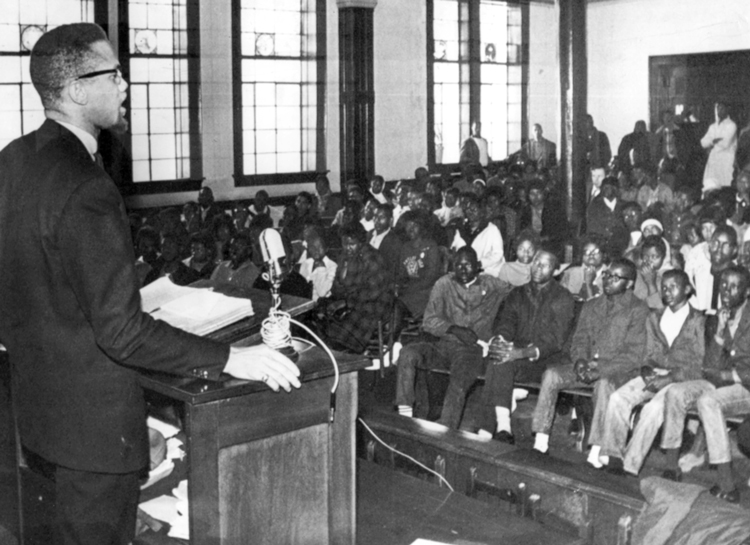Below is an excerpt from Malcolm X Talks to Young People, one of Pathfinder’s Books of the Month for November. This speech, titled “See for Yourself, Listen for Yourself, Think for Yourself,” was given to high-school-age youth from McComb, Mississippi, who had been involved in civil rights battles there, at the headquarters of the Organization of Afro-American Unity in Harlem, Jan. 1, 1965. During their efforts to register people to vote in 1964, Ku Klux Klan thugs had bombed or set fire to more than 15 churches, homes and businesses in McComb. Copyright © 2002 by Betty Shabazz and Pathfinder Press. Reprinted by permission.
[O]ne of the first things I think young people, especially nowadays, should learn how to do is see for yourself and listen for yourself and think for yourself. Then you can come to an intelligent decision for yourself. But if you form the habit of going by what you hear others say about someone, or going by what others think about someone, instead of going and searching that thing out for yourself and seeing for yourself, you’ll be walking west when you think you’re going east, and you’ll be walking east when you think you’re going west. So this generation, especially of our people, have a burden upon themselves, more so than at any other time in history. The most important thing we can learn how to do today is think for ourselves.
It’s good to keep wide-open ears and listen to what everybody else has to say, but when you come to make a decision, you have to weigh all of what you’ve heard on its own, and place it where it belongs, and then come to a decision for yourself. You’ll never regret it. But if you form the habit of taking what someone else says about a thing without checking it out for yourself, you’ll find that other people will have you hating your own friends and loving your enemies. This is one of the things that our people are beginning to learn today — that it is very important to think out a situation for yourself. If you don’t do it, then you’ll always be maneuvered into actually — You’ll never fight your enemies, but you will find yourself fighting your own self. …
Never at any time in the history of our people in this country have we made advances or advancement, or made progress in any way just based upon the internal good will of this country, or based upon the internal activity of this country. We have only made advancement in this country when this country was under pressure from forces above and beyond its control. Because the internal moral consciousness of this country is bankrupt. It hasn’t existed since they first brought us over here and made slaves out of us. They trick up on a conversation and make it appear that they have our good interests at heart. But when you study it, every time, no matter how many steps they take us forward, it’s like we’re standing on a — what do you call that thing? — a treadmill. The treadmill is moving backwards faster than we’re able to go forward in this direction. We’re not even standing still—we’re walking forward, at the same time we’re going backward. …
[T]here has been a move on to keep the Negro thinking in this country that he was making strides in the civil rights field, only for the purpose of distracting him and not letting him know that were he to acquaint himself with the structure of the United Nations and the politics of the United Nations, the aim and the purpose of the United Nations, he could lift his problem into that world body. And he’d have the strongest stick in the world that he could use against the racists in Mississippi.
But one of the arguments against getting you and me to do this has always been that our problem is a domestic problem of the United States. And as such, we should not think to put it at a level where somebody else can come and mess with United States domestic affairs. But you’re giving Uncle Sam a break. Uncle Sam’s got his hands in the Congo, in Cuba, in South America, in Saigon. Uncle Sam has got his bloody hands in every continent and in everybody else’s business on this earth. But at the same time, when it comes to taking forceful action in this country where our rights are concerned, he’s always going to tell you and me, “Well, these are states’ rights.” Or he’ll make some kind of off-the-wall alibi that’s not a bona fide alibi — not because it’s an alibi, but to justify his inactivity where your and my rights are concerned. …
Now, you’ve lived in Mississippi long enough to know what the language of the Ku Klux Klan is. They only know one language. If you come up with another language, you don’t communicate. You’ve got to be able to speak the same language they speak, whether you’re in Mississippi, New York City, or Alabama, or California, or anywhere else. When you develop or mature to the point where you can speak another man’s language on his level, that man gets the point. That’s the only time he gets the point. You can’t talk peace to a person who doesn’t know what peace means. You can’t talk love to a person who doesn’t know what love means. And you can’t talk any form of nonviolence to a person who doesn’t believe in nonviolence. Why, you’re wasting your time.
So I think in 1965 — whether you like it, or I like it, or we like it, or they like it, or not — you will see that there is a generation of Black people born in this country who become mature to the point where they feel that they have no more business being asked to take a peaceful approach than anybody else takes, unless everybody’s going to take a peaceful approach.
So we here in the Organization of Afro-American Unity, we’re with the struggle in Mississippi 1,000 percent. We’re with the efforts to register our people in Mississippi to vote 1,000 percent. But we do not go along with anybody telling us to help nonviolently. We think if the government says that Negroes have a right to vote, and then when Negroes go out to vote some kind of Ku Klux Klan is going to put them in the river, and the government doesn’t do anything about it, it’s time for us to organize and band together and equip ourselves and qualify ourselves to protect ourselves. [Applause] And once you can protect yourself, you don’t have to worry about being hurt. That’s it. [Applause]


